Our Hidden Digital Libraries 2013-08-06
How I learned about my dad, and the difficulties my son could find in learning about me the same way
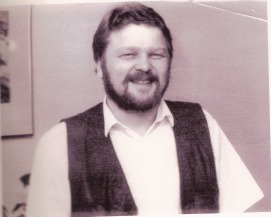
When I grew up, a lot of my father's influence on me was through the 1800+ books that took up most of the wall space where we lived.
The first book I remember trying to read (though I am sure it was not), was a history of the US Civil War in English published in the early 1900's.
I was about four, and had to spell my way through each word, and didn't know English, so then subsequently either had to look the word up in a dictionary (which involved a lot more laborious spelling),
I remember, vaguely, that the first few lines (and quite possibly only lines) I read were about Fort Sumter.
The book had been passed down to him, and had originally been purchased new in the US by a family member - I don't any more remember who, but it might have been my great grandfather - who had lived in the US for a while.
I also remember an atlas published by Rand MacNally and purchased around the same time, and spent many hours looking through it.
Many of my earliest memories are about the books that surrounded me. Many others are about the records my parents used to play.
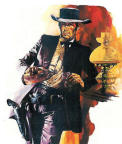 In the flat we lived in when I started reading, some of the more unsavoury books, such as the 83 books in
the original Morgan Kane
series (a pulp western series by Norwegian author Kjell Hallbing under the pseudonym Louis Masterson) had
even been relegated to a spot in a corner behind another row of books. Not so much to hide them (they were
easy to spot) as because of lack of space.
In the flat we lived in when I started reading, some of the more unsavoury books, such as the 83 books in
the original Morgan Kane
series (a pulp western series by Norwegian author Kjell Hallbing under the pseudonym Louis Masterson) had
even been relegated to a spot in a corner behind another row of books. Not so much to hide them (they were
easy to spot) as because of lack of space.
But at 7-8 years old, this was still enough to make them more exciting than they already were (the books were rather liberal with the amount of descriptions of sex and violence).
It took me a few years to read through the series. When Kjell Hallbing after many years hiatus published a bestselling follow up series when I was in my teens, my dad I and I shared the books. I particularly remember some mornings coming with him to work, where we spent the bus ride talking about them.
My Own Personal Library
What has made me think about this, is that my son is now four years old - the same age I was when I started to spell my way through my first books. And even if he doesn't end up starting to read, or get as excited about reading as I was, it worries me that so much of my personal library is hard to spot, and unorganized:
While we have some books on the shelves, the majority of my "library" consists of a set of files littered over multiple machines and some cloud services, none of which he would have easy access to.
As I grew up, I by no means read all my father's books, but I did read quite a few. I also raided his old record collection, and some of the albums he bought as a young man are still amongst my favourites. It introduced me to Barry McGuire and his version of Eve of Destruction:
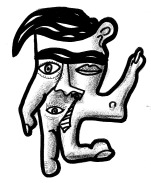
dads notebooks, ca. 1970
Eventually, I found his own notes, drawings and various longer writings.
My notes are hard to find. My music is hard to find. My books are hard to find.
The hundreds of documents - research papers for example - that has shaped how I think are hard to find.
Not to mention the vast number of Web pages I visit that I just bookmark - many of which have since disappeared and are often lost even to me (but I at least remember parts of what they were about).
Legacy
I'm not worried about leaving some legacy for the world at large. I am thinking about how this shift will alter what our children will learn from us. Because despite the numerous conversations I had with my dad, I also picked up a lot indirectly, through a large personally curated library that was all around me growing up.
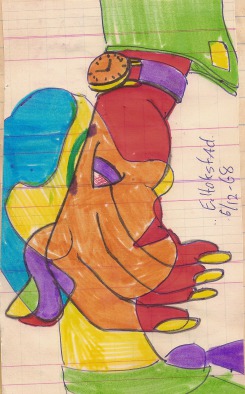
Dec. 6th 1968, when he was 18
I certainly would still have learned about many of the "obvious" books that he wanted to recommend to me - a lot of the sci fi that first got me excited about technology, for example.
But other books he first talked to me about because I looked through our shelves and he found me reading some book or other he'd not thought about.
And other things he never spoke about at all, such as his own writing and drawing, some of which (poems and letters to the editors, and a few drawings) was published in Norwegian newspapers, as well as Nova - a Norwegian science fiction magazine published in the early 70's. I also found a draft for a sci fi novel he had written while in prison for refusing conscription to the Norwegian military.
Though I saw evidence of his creativity all around me while growing up, ranging from an ornately carved chess table and pieces, through constant projects, those parts were hidden to me until I found the artefacts. Some of this I only found by being nosy and digging through our book shelves and finding hidden treasures behind the other books, or in our attic.
What I might leave for my son is in many ways much harder to pin down. I do have some on paper, all from the time up until I was about 20. Beyond that, my records are almost all digital and many of them are obscured for me too - I have much of it, but don't know where, and it is at severe risk of being lost.
Huge amounts are out there to discover on a variety of web sites where I have commented, but even if I have commented under my own name or an easily recognizable username, such as on Hacker News, many of these sites will eventually disappear and while the Internet Archive is an amazing resource, we can not depend on it being complete. But much of what I have written have also been under user names with no direct connection to my name, and though in many cases I have not made it very hard to discover by identity for someone reading my posts on many of these sites, making the connection from my name to my user names is in many cases much harder.
Some of us will expose a lot of this information via Facebook timelines etc. But even Facebook will not necessarily live forever, even though it looks like everything posted there will persist forever today. Even so, a large point for me is that a lot of the ways through which I learned about my dad are through things he would not have posted publicly under his own names. His letters to the editor(s) were all signed with a pseudonym, for example.
A lot of digital records I care about have already been lost.
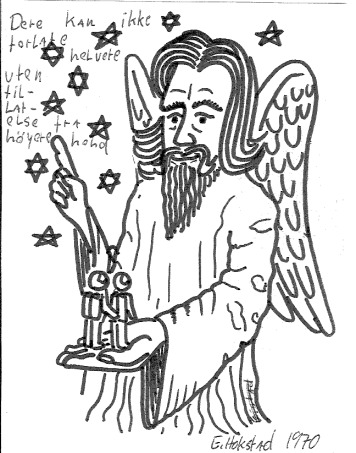
From my dads notebooks - I believe this was one of his submissions to "Nova"
but I don't remember if it was published;
The Losses I Grieve
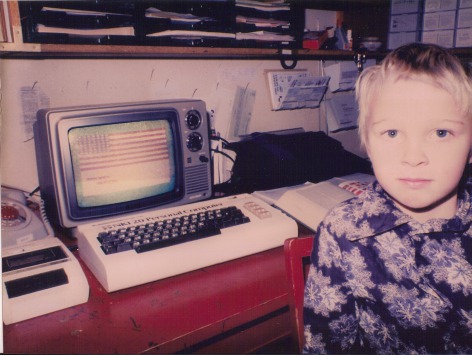
Some of my earliest memories of my dad are also of digital artefacts that were lost to me 25 years ago or more:
I learned to program because I saw him program a game on the VIC-20 he had on loan from the adult education organization where he worked on various courses and was employed for a while. I watched him from a distance, and started copying the BASIC keywords I could see on screen.
I remember a "Scramble" type game (Scramble was, a year or two later, one of the first games we bought for the C64), and how he was drawing out graphics on graph paper (as I would a few years later) before calculating the values to POKE into memory, though I did not at that point understand what he was doing, but got to play the game.
I remember a very simple text adventure of sorts from a year or two later, as we had a Commodore 64 on loan, so probably when I was 6 or 7. He wrote it specifically for me. It required a "secret code" to start. I remember the code to this day and occasionally use it for things where security is not a majory issue. I spent hours after he finished with this game changing it and extending parts of it, and it played a big role for me in learning to program.
Both of these were lost to me. Looking after them did not seem important to me then, obviously, and I don't think my father thought of it either - it was something transient.
My next big losses are all the programs I wrote for the C64. Nothing of significance to others, but a number of parts for demos, little games, utility programs. Then the Amiga - my first proper compilers. A series, starting with one written in M68k assembler, and moving on to Pascal (though compiling my own language). For the latter compiler I "rediscovered" Dijkstra's Shunting Yard Algorithm that I've written about before.
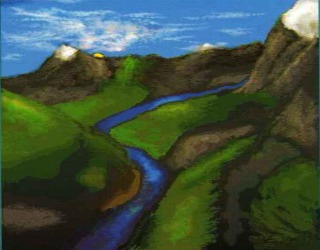
From Det Nye COMPuter, issue #2, 1992
I also lost all but one of my drawings, many of which I spent weeks on. I remember two in particular: A drawing of Superman that I painstakingly did pixel by pixel, and an impressionist inspired autumn landscape I drew based on a photo in a British tourist guide.
One of my drawings was published, in a small distorted version, as the monthly winner of the graphics competition in a Danish computer magazine called "Det Nye COMputer". I just today found a series of scans of the magazine issues, and what you see here is the result of image being printed squashed to half the intended width (I used an unusual resolution, and it clearly confused them, to my great irritation when I saw it in print back then), scanned in by someone, cut out of the scan and re-scaled back to roughly the original size.
Only luck has left me with a reasonably unmangled version of that one drawing.
Some were uploaded to various Norwegian BBS's, but most likely I'll never see any of them again. None of them have much artistic merit; that is not the point. The point is the personal loss, and how it alters what opportunities coming generations get for learning about where they come from, and getting inspired.
I only saved a lot of my writing from that period because I tended to print my poems and notes out to make annotations when away from home. Others because I kept a hand written diary of sorts.
There is a research paper I regularly remember, that I have tried to identify several times over the last decade, that I have been unable to find again.
How Can We Expose Our Hidden Libraries?
And so we come to the main issue.
I have come to thing of all of the data I have "locked up" on hard drives or online that are not easily accessible as a "hidden library". Much of it will never be visible to anyone if it is kept the way it currently is kept.
I find I even sometime forget about books I have read myself, and that I still have copies of, because they are hidden from view, in electronic collections with no spines to casually spot in a book shelf, or even shelf with related volumes to remind me.
I have long tried to organize my notes and my reading on personal wikis, but that suffers from manual updates.
There are a number of problems to solve: archival, lookup and search, serendipitous (re) discovery.
For discovery, I have for a while been thinking that I should set up a digital picture frame or a cheap tablet or similar, and have it cycle items from my digital collections to help expose my son (and myself!) to all the things I have locked up.
But for that to be truly useful, I need to turn the masses of data I have into useful collections. That takes an investment in tools - not of money, but of time. I am on constant lookout for recommendations for the best tools for this, at the moment.
But there also are gaping holes where, and the problem of integrating diverse collections. E.g. e-mail archives across multiple e-mail services; comments and posts on websites other than my own; bookmarks and archived copies of articles online that are important to me. Wired might be trusted to keep Mother Earth Mother Board by Neal Stephenson up for some time longer, and the Internet Archive will probably have it for longer, but I also need to surface it - finding the equivalent of having it in a book with a visible spine on a shelf - for which I need to collect a copy or at least index it.
I have no conclusion. I fear this will be a long journey.